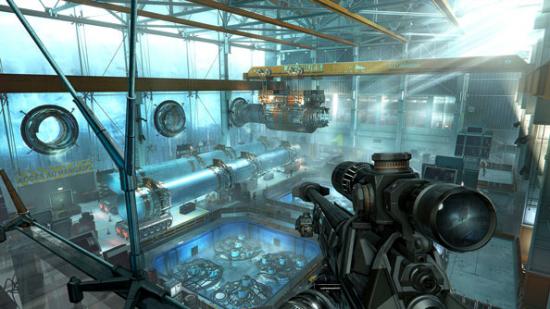When Deus Ex: Mankind Divided was first announced, I reacted to it with quiet excitement. Human Revolution marked a welcome and important tonal shift for the series five years ago, and Mankind Divided looks set to follow closely in the footsteps of its predecessor in terms of presentation, gameplay and story – which is a continuation of Adam ‘Neo’ Jensen’s adventures in a cyberpunk world of augmentations and ruthless corporatism. It’s a solid blueprint, but one that, at first glance, seemed a bit too familiar to really pique my interest.
Related: check out our rundown of absolutely everything we know about Deus Ex: Mankind Divided.
And my excitement remained quiet as I began my recent eight-hour hands-on at Square Enix HQ. The tutorial took me through the motions of stealth, takedowns, combat and – of course – crawling through vents, in a Dubai skyscraper that had that tasteful goldy-brown tint we all know so well from Human Revolution.
But then the introductory formalities end, and I’m thrown into the city hub of Prague, fully open for exploration. It’s richly detailed, rife with lore, and brimming with atmosphere. As I wander the streets, the progress made in the half-decade since Human Revolution becomes apparent. My excitement gauge creeps up from ‘quiet’ to ‘vocal’, as I explore one of the most impressive city hubs I’ve ever seen in a game.
Deus Ex has always rigorously followed the semi-open-world city hub formula. Each game features several locations that you visit at different points in the plot – all filled with streets, backalleys, sewers, vents, hideouts, apartment complexes and bars. What makes Prague stand out is that even though it still adheres to that formula, it feels like a real-world city not so far removed from our reality (unlike the oppressively dark, metallic hubs of its predecessors).
The city is identifiably Prague – a mixture of stone buildings and colourful-but-faded facades of old townhouses integrated with the electronic keypads and metallic structures and technologies that we associate with Deus Ex. Gone is that gold-and-black hue we’ve become used to, and strikingly we actually see normalish daylight (for the first time in the entire series, if memory serves?).
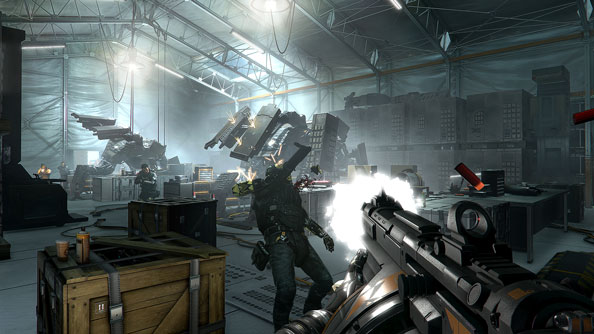
There’s a symbolic reason for this too, according to the game’s writer Mary DeMarle – the ‘Cyber-Renaissance’ that the golds and blacks represented is under threat in Mankind Divided. It’s a world in which augmented people face discrimination from non-augs following the catastrophic events at the end of Human Revolution, when the Illuminati (that low-hanging fruit of ‘shady organisations’) unleashed a bug causing augs to turn uncontrollably violent.
The notably colder colour palette and futuristic architectural flourishes of Prague are termed by DeMarle as “corporate brutalism”.
“The world has changed in Mankind Divided,” she says. “There are still elements of the cyber-renaissance dream, and you’ll see those colours [golds and blacks] in areas that continue to hold out for augmentations. But that era is ending, which is why you’ll see a lot more blues and greys in Prague, as well as heavy, oppressive architecture that’s inspired by brutalism.”
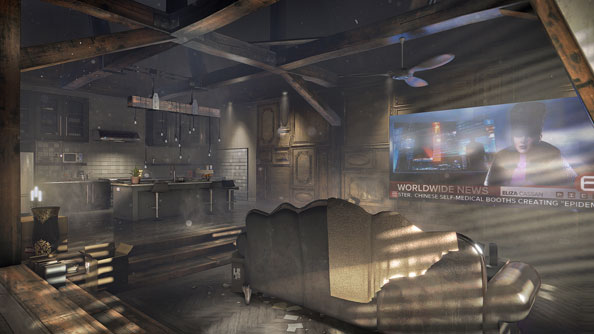
Prague is a place where the simmering tensions over augmentations that we’ve seen in previous Deus Ex games have boiled over into paranoia and prejudice. There are checkpoints everywhere, separate security checks for augs and non-augs, and people looking at you suspiciously from the corners of their eyes, wary that you might freak out at any second. Yet despite all this, Prague’s old-world qualities and architecture shine through, and there are plenty of moments where you could easily be on a virtual tour rather than in a game. The rich atmosphere is supplemented by the hypnotic, haunting score of Michael McCann (returning from Human Revolution), whose work on the series continues to deliver some of the best cyberpunk soundtracks around.
From an intrepid gamer’s perspective, Prague is paradise. Within minutes of stepping out of Jensen’s pad I’ve hacked my way into one apartment where a cultist is sitting by the bed of his master – ranting insanities about some nano-augmented god – then climbed through a window of another flat and knocked out a thug while he was planning a crime. His ‘punk’ girlfriend (because ‘thugs’ and ‘punks’ apparently make a perfect couple) had her back turned as I assaulted her lover, and seemed nonplussed when I jumped in front of her and chatted to her while he lay crumpled on the bed. I helped myself to their belongs, and left.
I head towards my main objective, which is to track down Koller, an underground augmentation expert who needs to check that Jensen’s inner wiring is all intact following a bomb attack at the train station earlier on. Meandering through the streets, I continue to admire the city’s organic feel. Dead autumnal leaves overflow from gutters and lie in piles on the pavement, paint peels from baroque houses onto the cobbled streets below, and old-fashioned electricity lines web their way between buildings. Mankind Divided bridges the series’ strong cyberpunk sensibilities with the real world, and it looks fantastic.
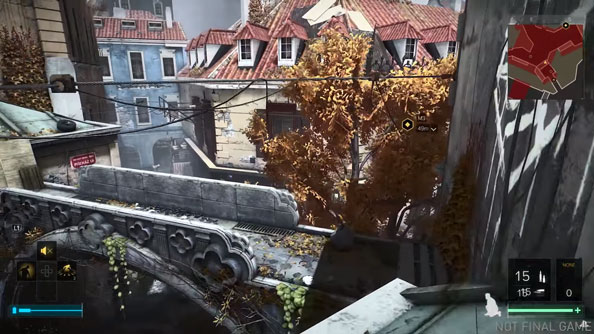
The district where my man’s hiding out is blocked off by a checkpoint. The fickle guard tells me that I can get myself a fake ID from a friend of his in another part of town, but forgery is too ‘by the book’ for my liking, and I decide to test out this new level of verticality I’ve been hearing about. It’s a welcome touch of ‘Dishonored’ in a series that previously felt a bit flat given its heavy focus on exploration. With that said, Jensen isn’t as graceful a climber as Corvo, so I carry out my rooftop mission at a pedestrian pace, appreciating the little details like the shoddy graffiti in hard-to-reach places and the gutter-stuffing leaves I mentioned earlier (yes, I’m obsessed with the leaves).
I jump in through the top window of the library where I’m supposed to be meeting my contact, and do a couple of classic stealthy takedowns on the occupying goons. I meet up with Koller who, with his checkered shirt, sleeveless jacket depicting some fictional band (‘Zombot’), and anarchic badges, exudes a great sense of style. He’s not some generic terrorist or hacker or agent as past Deus Ex characters have tended to be, but a guy tied into the culture of the game world (I’d love for him to tell me about Zombot if we didn’t have more pressing matters to deal with). Such cultural markers are all over Prague; there are adverts for products and movies, Banksy-like street art, newspapers, propaganda posters and of course dead leaves, all of which make Prague – the whole Deus Ex universe, in fact – feel like a place with its own zeitgeists and history.
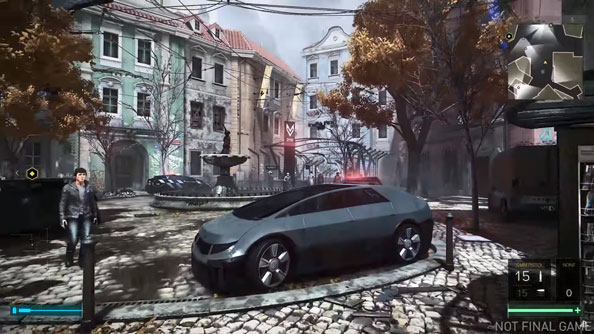
Koller sends me to retrieve a piece of technology (a ‘neuroplasticity calibrator’, if that means anything to you) from a local mafia boss. I head across town to the gangster’s underground casino, which is accessed through a sewer. When I meet him, I put my dialogue skills to the test, but my awkward combination of brown-nosing and hard-talking swiftly gets me kicked out at gunpoint. Talking’s for losers, anyway, I think to myself bitterly. As I’m leaving, I consider turning around and chucking a grenade or two at the bastard and his cronies to get things over and done with… But even though the beauty of Deus Ex is that you can approach things that way, I’ve always felt the series thrives most with a stealthy approach, which inevitably means you explore more, discover more, and engage more in the level design.
So I push aside my fantasies of explosive carnage and leave without incident. I quickly find a side-door that I hack (using the same enjoyable node-capturing minigame as in Human Revolution), leading me to a room through which I get under the floorboards of the casino. My niggling compulsion to ‘do things properly’ and not get caught means that I repeat the mission about five times before getting it right – without a single shot fired, and just one concussed guard in my wake. I grab the neuroplastic wotsit, and get the hell out of there the same way I came in, closing each hacked door behind me as if I was never there in the first place.
Job done. Compulsion for stealth satisfied.
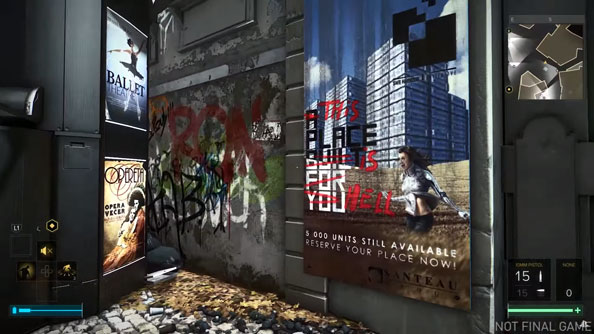
The impressive presentation of Prague elegantly glosses over the fact that Mankind Divided plays almost identically to Human Revolution, relying on that trinity of stealth, action and conversation. The adjusted cover system lets you send Jensen on automated runs for distant bits of cover, but this never proved very reliable for me, and I preferred to keep him under close control. There are several new ‘experimental’ augmentations for you to play with too, though you’ll need disable other augs to prevent Jensen from burning up like an overclocked graphics card.
In the nicest possible way, the gameplay of Mankind Divided is more of the same, albeit polished to make Jensen slicker and more heroic than the previously clunky mechanics allowed. Where the game really elevates itself is in the phenomenal world-building, as exhibited in the city hub of Prague. Its scope and interactivity build on the solid foundations set in Human Revolution, and the more life-like presentation of the city make it a believable place that beckons you to explore its every corner.
Maybe that’s why I’m so fixated on those dried leaves. They embody the organic, lifelike feel of Prague in Mankind Divided; a touch that, until now, I never realised was missing from the series.
